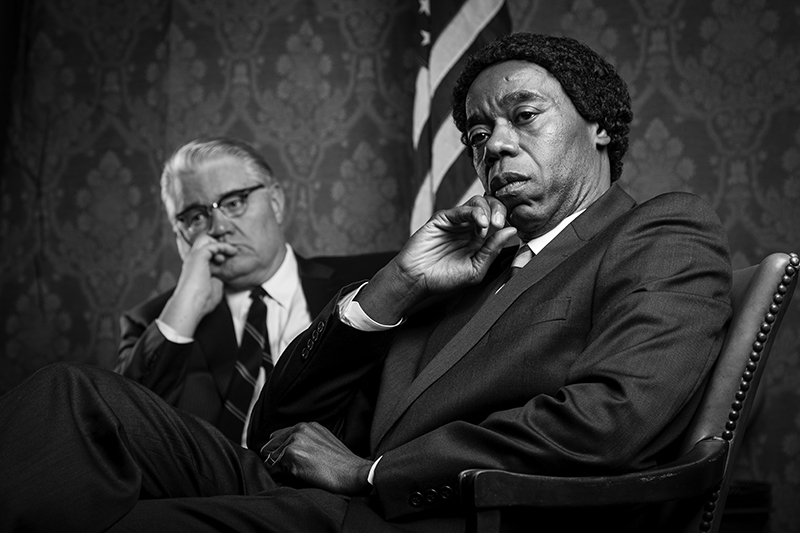When we think of Lyndon Baines Johnson, 36th President of the United States, we tend to think of the Vietnam War. Not many know that just days after LBJ stepped in as president following the assassination of John F. Kennedy, he approached Congress with his first priority as president: the Civil Rights Act of 1965.
The act was originally Kennedy’s work and Johnson felt it important to pass it as soon as he could. Civic Theatre’s All The Way captures this, dishing out a history lesson laced with humor. Jon March, who plays LBJ in the play written by Robert Schenkkan, said it’s important for voters to understand this point of time in history.
The play is truly depictive of the times, as it contains graphic language and racial slurs — so much so that March said he debated inviting his grandkids to the show for that reason alone, but decided the history lesson was more important for them to learn.
“Everything that’s in the play, the majority is drawn from sources of the period,” said Director Bruce Tinker. “The playwright did a tremendous amount of research and found actual dialogue and actual language, and I think it’s going to threaten some people. They’re going to be very disturbed that there were actually people that would say and think these things and actually be elected over and over again because they said and thought some of these things, and the fact that people weren’t listening or paying attention to a lot of the crimes that were being perpetrated, particularly against African Americans.”
Another important focus of the play is the Voting Rights Act, which was not passed at the time of the Civil Rights Act because “Johnson felt that it simply couldn’t be done at that time.”
“And while this play doesn’t see that fulfilled, because it stops in November of 1964, in fact that happened,” March said. “The focus is on the Civil Rights Act of 1964, which remains today the cornerstone of civil rights in the country. … That’s another lesson that people in this country need to recall.”
On voting rights, Tinker referenced the 2013 Supreme Court court case of Shelby County v. Holder, which struck down the provision of the Voting Rights Act that said states had to have federal clearance before changing voting laws.
“That really bothered me, as a citizen of this country,” Tinker said. “I thought we needed to revisit this story and remind people about that toll, and the legacy, the history and the importance of protecting everyone’s right to vote.
“Everyone should be allowed, encouraged and eager to cast their vote in any election. That’s a right we have, and I think it’s a pretty unique right in the world at the level that we have it in this country. And sometimes when you take things for granted, it is very easy to take them away without anyone noticing and that’s what happened with voting rights.”
The play is set on a circular stage that makes the audience feel like they are in a congressional auditorium. Historical projections on the wall bring viewers into the environments of the times. Twenty-eight actors play a total of 50 characters, calling for a lot of quick costume and character changes.
“There’s a great amount of humor in the play, because these were interesting, big characters,” Tinker said. “LBJ, he was unbelievable as a character, bigger than life certainly. And then some intellectual giants like Martin Luther King are part of this story.”
Eddie Stephens, who plays Martin Luther King, Jr., said the role was a “dream come true.” Stephens just started acting last year, with his debut role being in Civic’s Ragtime, which won a handful of awards at last year’s Grand Awards. He made his second debut later in the year in Circle Theatre’s To Kill a Mockingbird.
“This play, to me, is not a play — it’s life,” Stephens said. “Because everything that is being talked about in All The Way, whether it be the Civil Rights Act itself or the Voting Rights Act in 1965, I was four and five years old when those things were actually happening.”
Stephens is one of five siblings who were born in Alabama and who, along with their parents, migrated North in the sixties.
“It is not just a play, it’s looking back over life for me, which makes it even more special,” Stephens said. “One of the reasons that I really wanted to be part of this, is that in addition to entertaining, community theater in particular has a great opportunity to educate and to teach.
All The Way
Grand Rapids Civic Theatre
30 N. Division Ave., Grand Rapids
Jan. 12-28, $16-$28





